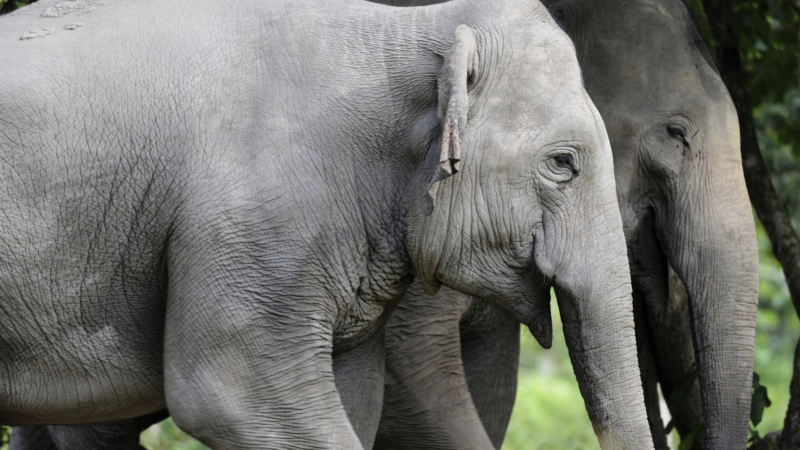The Asian elephant population in Cambodia is more robust than previously thought
PHNOM PENH, Cambodia — A genetic study of Asian elephants in northern Cambodia published Thursday reveals a larger and more robust population than previously thought, raising hopes the endangered species could slowly recover.
Researchers from the Fauna & Flora conservation group collected samples from elephant dung in Cambodia’s northern plains and extracted DNA. From the DNA they were able to identify individual elephants, estimate population size, and determine the sex of the animals and the overall genetic diversity of the population.
From their work they estimated that there are 51 elephants in the Prey Lang, Preah Roka, and Chhaeb Wildlife Sanctuaries, with greater genetic diversity — a “critical factor for long-term viability,” the researchers said — than in two other areas of the country in which they live.
“With sufficient suitable habitat remaining in the region, the population has the potential to grow if properly protected,” the report concludes.

Overall, some 400 to 600 Asian elephants are believed to remain living in the wild in Cambodia. Researchers said the study’s findings underscore the potential of the northern area studied to become a “national stronghold” for them, contributing to Cambodia’s biodiversity conservation goals.
“Habitat degradation, especially when it leads to fragmentation, continues to be a serious concern,” Pablo Sinovas, director of Fauna & Flora in Cambodia, told The Associated Press.
“This study provides a robust basis on which to base conservation efforts and landscape management.”
The study, supported by USAID funds and Britain’s People’s Postcode Lottery, was conducted in collaboration with the Cambodian Environment Ministry. The genetic testing was done at the Royal University of Phnom Penh with technical support from the Royal Zoological Society of Scotland.
The research was carried out in the 2020-21 dry season, but Sinovas said since elephants reproduce slowly it is not thought that the population size would have changed significantly since then.

Researchers want to replicate the study elsewhere in Cambodia and in other countries, such as neighboring Vietnam where the Asian elephants live in fragmented populations.
“We were very pleasantly surprised by the results of the project,” said Alex Ball, conservation manager for the Royal Zoological Society of Scotland.
“We now hope to expand this methodology across Cambodia and beyond, helping to build a clearer picture of Asian elephant numbers, which will inform how best we can work to help reverse the decline of these spectacular animals.”
How George Wallace and Bull Connor set the stage for Alabama’s sky-high electric rates
After his notorious stand in the schoolhouse door, Wallace needed a new target. He found it in Alabama Power.
FIFA president defends World Cup ticket prices, saying demand is hitting records
The FIFA President addressed outrage over ticket prices for the World Cup by pointing to record demand and reiterating that most of the proceeds will help support soccer around the world.
From chess to a medical mystery: Great global reads from 2025 you may have missed
We published hundreds of stories on global health and development each year. Some are ... alas ... a bit underappreciated by readers. We've asked our staff for their favorite overlooked posts of 2025.
The U.S. offers Ukraine a 15-year security guarantee for now, Zelenskyy says
Ukrainian President Volodymyr Zelenskyy said Monday the United States is offering his country security guarantees for a period of 15 years as part of a proposed peace plan.
Genre fiction and female authors top U.S. libraries’ most-borrowed lists in 2025
All of the top 10 books borrowed through the public library app Libby were written by women. And Kristin Hannah's The Women was the top checkout in many library systems around the country.
The Best Tiny Desk Concerts of 2025
Which Tiny Desk made an audio engineer question everything? Which one made a producer want to cry? Touch grass? Look back on the year in Tiny Desk, with the people who make them.








